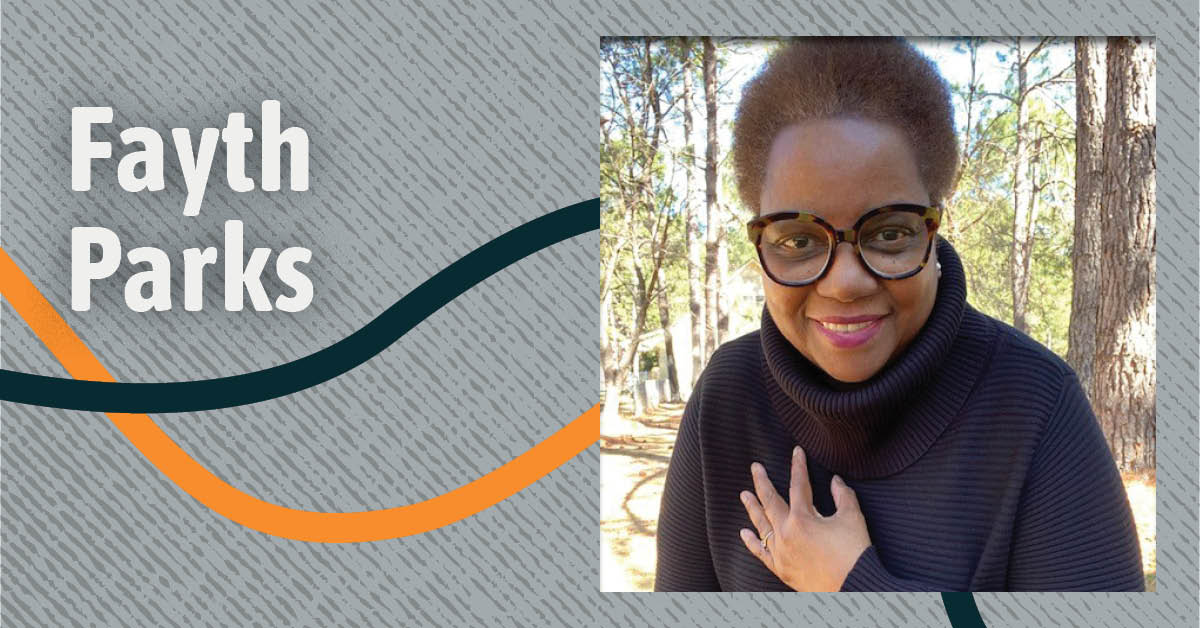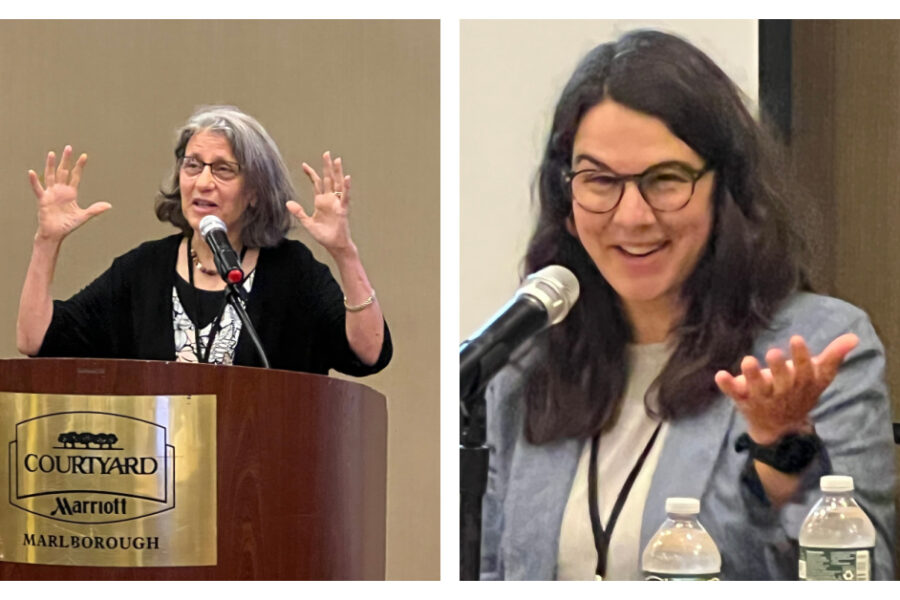Dr. Fayth Parks officially joined the Graduate School of Leadership and Change in July 2022. Prior, she has been at Georgia Southern University for over 20 years, most recently as Professor in the Counselor Education Program in the Department of Leadership, Technology and Human Development. Her areas of deep interdisciplinary interest are spirituality and servant leadership, and the value of love as an approach to leadership. As a counseling psychologist by training and profession, Fayth is drawn to helping individuals and communities address trauma and healing that draws from a cultural lens, particularly African traditions. In terms of her methods of inquiry, Fayth finds power in storytelling, narrative inquiry, and arts-based and ethnographic work. She is currently taking courses herself in documentary film-making and multimedia production.
We wanted to share a bit more with our learning community about Fayth’s interests, experiences, and hopes as she begins this new phase in her professional life so we recently conducted this brief interview.
GSLC: We are so pleased that you have joined us this summer. This is thrilling for us and I hope for you.
FP: Thank you for offering me this opportunity. It’s an exciting next stop on my career journey.
GSLC: So, what is it that you find most appealing about the Graduate School that convinced you to join us?
FP: The PhD in Leadership and Change program is designed to train leaders and social change agents. Program faculty are passionate leaders and scholars themselves. They don’t just talk the talk, they walk the walk. Faculty, staff, and students demonstrate an awareness and commitment to diversity. Additionally, the program encourages an appreciation for the multiple ways of knowing that diversity brings to the table.
GSLC: You have a deep understanding of and broad experience in higher education. What do you see as the most distinctive or unique aspects of the Graduate School as you look across the landscape.
FP: A few thoughts come to mind.
The PhD in Leadership and Change is a competency-based rather than a course-based program. Competency requires the ability to do something successfully. It is one thing to know the information, but knowing how to apply that knowledge makes a huge difference for learners. So, knowledge and skills are the program’s focus.
GSLC values mid-to-senior practitioners’ lived experiences as a foundation for building a leadership scholar-practitioner identity.
The PhD requires doctoral-level research that can potentially impact change and improve practice in a candidate’s profession, organization, or community.
As I mentioned earlier, the program recognizes multiple ways of knowing. Inquiry and knowledge are culturally, politically, and globally situated. Therefore, how phenomena is investigated requires thoughtful consideration of context and methodology. How data are interpreted requires the same thoughtful consideration of context.
GSLC: We have designed the programs of the Graduate School for cross-sector scholar-practitioners, to train those who are leading with the skills and knowledge as responsible leaders and socially engaged researchers to improve the lives of those they serve. Can you identify the top skills/knowledge you bring that you feel could contribute most to this endeavor?
FP: I bring the requisite academic teaching experience, research skills, and scholarly accomplishments. I also bring leadership skills and experiences working in academic and community settings. I bring vision and problem-solving skills. Vision requires imagination and innovation, often disrupting the status quo. I approach problems systemically and encourage creative, collaborative, solution-focused outcomes.
For more than twenty years, I have studied healing traditions and wisdom traditions because they are the storehouse for humanity’s universal truths. I believe we can rise to the challenges of today’s world and flourish if we embrace universal truths such as the nature of genuine joy and love and our potential for greatness.
GSLC: What leadership and/or change scholars or practitioners have most influenced your path in this field?
FP: Mentors who influenced me come to mind. These people taught me about being committed to leadership and community service (practice). For example, my high school teacher/mentor would bring me along on Saturday mornings to provide reading and math tutoring at the local YMCA. Early in my student affairs career in university housing, I had a supervisor who modeled relational leadership. These role models guide my leadership and community engagement practice today.
GSLC: And, would you be willing to share what you’re reading right now – what’s sitting on your bookstand or kindle?
FP: Currently, I’m reading two books. I tend to switch between books.
I started reading The 1619 Project earlier this year. This book is an inclusive re-writing of America’s origin story to fully explore the Black experience in America from slavery to present day.
I am also reading All About Love by bell hooks. Our ancestor-sister-scholar explores the question “What is love?” With incisive wisdom and wit, hooks challenges us to use love as a verb instead of a noun.
GSLC: I can’t imagine a stranger time to be conducting a search. The entire search process was, in fact, done without us getting together physically. While that was never the expectation, what did you learn about our program and Graduate School during the search process or perhaps, because of it, that stands out for you.
FP: As I mentioned earlier, the GSLC program has a unique curriculum design and talented faculty. Because I did not have an opportunity for an in-person visit, the information on the website was invaluable. Videos put faces to names and provided faculty, staff, and student perspectives. Curriculum and student handbooks and the Delphi study results shared with me as a finalist were very informative. Faculty commitment to student learning and program growth stands out. And, Dean Alexandre’s warmth and responsiveness during the search process also stands out.
GSLC: If we were doing this interview a few years from now (and I hope we do!), and I asked you to look back on your time with us, what would you have liked to have learned? Done? In what ways would you like to have seen yourself grow?
FP: I would like to have learned more about the GSLC program from a few years of great experience. I hope to build amazing relationships with my GSLC colleagues and the scholar-practitioners we serve. Also, I would like to contribute to the growth of the program. And, it would be exciting to have grown in my integration of arts-based research and multimedia production into leadership and change scholarship and practice.
GSLC: I was struck by the excitement you bring to looking forward, learning new things, giving back, making a difference in the world in the years ahead. I wonder how you’ve been able to hold that focus forward during this most difficult time in our lives. Where do you find strength and hope?
FP: When anxiety, despair, and pessimism threaten my peace of mind, I rely on my spiritual practice to renew hope and reclaim my peace. Also, spending time with loved ones centers me on what is most important in life. On another note, taking a break by binge-watching Netflix works too. Shout out to “Great British Baking Show” fans!
GSLC: Would you please share something about yourself that you would like our community to know that they wouldn’t learn from your CV?
FP: I am taking documentary film and multimedia production courses. I am passionate about the power of storytelling to illuminate our shared humanity. The mission of my company Rising Sun Productions is to create multimedia content and produce engaging live events that uplift and inspire our audiences.





